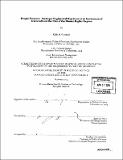| dc.contributor.advisor | Barry R. Posen. | en_US |
| dc.contributor.author | Greenhill, Kelly M | en_US |
| dc.contributor.other | Massachusetts Institute of Technology. Dept. of Political Science. | en_US |
| dc.date.accessioned | 2005-10-14T20:31:55Z | |
| dc.date.available | 2005-10-14T20:31:55Z | |
| dc.date.copyright | 2004 | en_US |
| dc.date.issued | 2004 | en_US |
| dc.identifier.uri | http://hdl.handle.net/1721.1/29434 | |
| dc.description | Thesis (Ph. D.)--Massachusetts Institute of Technology, Dept. of Political Science, 2004. | en_US |
| dc.description | Includes bibliographical references (p. 332-378). | en_US |
| dc.description.abstract | Using a combination of historical case studies and insights from formal modeling, this study proposes and tests a new theory to explain one piece of a poorly understood phenomenon, namely the strategic use of population flows as political and military weapons. Specifically, after first demonstrating the existence and relative pervasiveness of this phenomenon, this study tackles the question of how-and under what conditions-outflows may be exploited to facilitate a kind of unconventional coercion, which I have termed politicaljujitsu. Politicaljujitsu may be thought of as a "coercion by punishment" strategy, whereby weak, often undemocratic, actors turn the strengths and virtues of their more powerful adversaries on their heads, in such a way as to make possible coercion of the strong by the relatively weak. The theory posits that perpetrators seek to place their targets' values and/or normative commitments in direct conflict with their (usually) competing and heterogeneous political imperatives, in the expectation that targets will choose to concede to perpetrators' demands rather than suffer the anticipated political costs of resistance. Perpetrators do so, in part, by imposing "hypocrisy costs," i.e., those symbolic political costs that arise when there exists a real (or perceived) disparity between a professed commitment to liberal values and/or international norms, and demonstrated actions that contravene such a commitment. A further implication of the theory is that, ironically and tragically, as humanitarian norms have grown in strength, so has the power of those who would exploit them, both for virtuous and nefarious purposes. | en_US |
| dc.description.abstract | (cont.) While this study examines this kind of coercion in the context of refugee flows, the proposed theory is more widely generalizable, i.e., to any issue where states' values and or normative commitments may come into conflict with their material interests. To test the theory-, I have conducted four in-depth, longitudinal case studies, drawing upon a variety of primary and secondary sources, fieldwork, and interviews. Specifically, I examine outflows from Cuba (965, I980, 994); Kosovo (998-99); Haiti (I979-8I; I99I-94); and North Korea (mid i990os). Additional cases from central Africa; Southeast Asia; and central Europe are also utilized, where appropriate, to provide constructive comparisons. | en_US |
| dc.description.statementofresponsibility | by Kelly M. Greenhill. | en_US |
| dc.format.extent | 378 p. | en_US |
| dc.format.extent | 21748015 bytes | |
| dc.format.extent | 21747812 bytes | |
| dc.format.mimetype | application/pdf | |
| dc.format.mimetype | application/pdf | |
| dc.language.iso | eng | en_US |
| dc.publisher | Massachusetts Institute of Technology | en_US |
| dc.rights | M.I.T. theses are protected by copyright. They may be viewed from this source for any purpose, but reproduction or distribution in any format is prohibited without written permission. See provided URL for inquiries about permission. | en_US |
| dc.rights.uri | http://dspace.mit.edu/handle/1721.1/7582 | |
| dc.subject | Political Science. | en_US |
| dc.title | People pressure : strategic engineered migration as an instrument of statecraft and the rise of the human rights regime | en_US |
| dc.type | Thesis | en_US |
| dc.description.degree | Ph.D. | en_US |
| dc.contributor.department | Massachusetts Institute of Technology. Department of Political Science | |
| dc.identifier.oclc | 56191408 | en_US |
